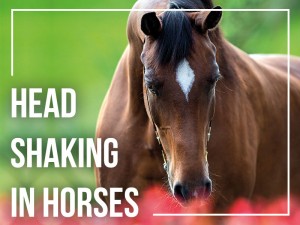
Head shaking in horses

Head shaking in horses is a condition that can simply be described as the shaking or nodding of the head in frequent, repetitive and involuntary movements as a response to pain or irritation of the head. These movements are often accompanied by snorting or sneezing.
This condition varies a lot between horses, from horses that present mild signs while others can present more severe degrees of head shaking. Some horses might stumble during exercise or try to rub their nose even with one of their front legs, in an attempt to get rid of the unpleasant feeling.
Head shaking is very distressing for the horse and it will affect their training as there is only so much horses can learn and evolve when they are struggling with such discomfort. Sadly, many horses suffering from head shaking are euthanized.
There is an incredibly wide range of causes for headshaking in horses: allergies to pollen, dust or other aerosolised agents, parasites such as ear mites or ticks, neurological problems, dental issues, respiratory disorders, sensitivity to UV light, poorly fitting tack and stress.
A successful treatment for this condition depends entirely on what is causing it. Owners should check their horse's tack, especially the bridle and bit, and ensure they fit correctly. The treatment can involve new approaches in management, riding or changing the horse's environment. Other solutions include the use of nose nets,UV masks, the use of contact lenses and medical therapy.
This condition is being researched and new options of treatment are being suggested and tested. A recent study has verified that percutaneous electrical nerve stimulation under the effect of a local anaesthetic can reduce the signs of headshaking syndrome in horses suffering from trigeminal-mediated headshaking. The study reported that the treatment was well-tolerated and that most horses were able to return to their normal work routine.
If you realise your horse is affected do not hesitate to seek veterinary assistance as it is very important to find the origin the problem in order for the treatment to be effective. Each case tends to be somewhat unique and the diagnosis is only achieved by testing different options and ruling out possible causes until the right one is found.
Would you like to know more about horses? Check our Equine Courses:
![]()
Equine courses
Read the previous article: Canine ear infections

